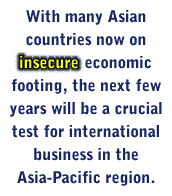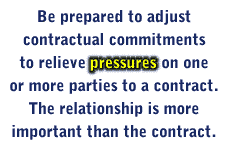 Here’s a brief history and probable scenario for the economies of the Asia-Pacific region.
Here’s a brief history and probable scenario for the economies of the Asia-Pacific region.
First, the history. A number of Asian countries grew fast, overspent on big development projects and their banks made bad loans to political cronies and close business associates. When it finally became apparent that these Asian countries couldn’t pay for their largesse, their currencies took a tumble against the currencies of countries with healthy, pay-as-you-go economies.
Second, the scenario. Imports by Asian countries from strong-currency countries like the United States will now become very expensive, and Asian businesses and profits will start to dry up. At the same time, Asian exports will become very cheap for strong-currency countries, and Asian businesses and profits will start to pick up.
 Conversely, exports to Asia from strong-currency countries will start to dry up but their imports from Asia, cheaper than ever, will boom. Suddenly the strong-currency countries will be spending much more in international trade than they are earning (they will be buying more in imports than they are selling in exports). Their trade balances will take a tumble, and their own currencies will start to weaken. Meanwhile, on the strength of strong exports, Asian currencies will begin to level off and strengthen.
Conversely, exports to Asia from strong-currency countries will start to dry up but their imports from Asia, cheaper than ever, will boom. Suddenly the strong-currency countries will be spending much more in international trade than they are earning (they will be buying more in imports than they are selling in exports). Their trade balances will take a tumble, and their own currencies will start to weaken. Meanwhile, on the strength of strong exports, Asian currencies will begin to level off and strengthen.
End of scenario. It all gets straightened out eventually. Like a globe of the world, what goes around comes around. Unfortunately, when things like global economies get out of whack, plenty of pain gets scattered about. People are thrown out of work, businesses fail, projects are put on hold, and new capital investment dries up. Moreover, resentments boil up and stand in the way of solving the economic problems at hand.
It was fortuitous that the annual meeting of the 18-member Asia Pacific Economic Cooperation (APEC) forum was held recently in Vancouver, just as the Asian economic problems were cresting. The forum presented a timely opportunity for the nations most affected by these problems to express their united commitment to solving them.
But commitment by some of the Asian members was understandably grudging. As a condition of bail-out loans provided by the International Monetary Fund (IMF), countries like Thailand, Indonesia and South Korea are required to adopt new economic reforms aimed at curbing bad loans and opening financial markets to foreign competition.
It is good that the IMF and the governments of the APEC countries are taking steps to remove institutional impediments to economic health. However, the most significant impediments are cultural misunderstanding and national pride.
 Witness the ongoing disputes between Asian and Western countries over what constitutes collaboration between government and business (a natural alliance in Asian collectivist cultures) and what is, in fact, official corruption (a threat to democracy and economic stability in Western cultures). And witness the claims by former Malaysian Prime Minister Mahathir Mohamad that the stringent economic reforms sought by the IMF, as a condition to bail-out loans to Thailand, Indonesia and South Korea, were an attack on the national sovereignty of these countries.
Witness the ongoing disputes between Asian and Western countries over what constitutes collaboration between government and business (a natural alliance in Asian collectivist cultures) and what is, in fact, official corruption (a threat to democracy and economic stability in Western cultures). And witness the claims by former Malaysian Prime Minister Mahathir Mohamad that the stringent economic reforms sought by the IMF, as a condition to bail-out loans to Thailand, Indonesia and South Korea, were an attack on the national sovereignty of these countries.
In my view, to repair Asia-Pacific economic dysfunction, it is as important to overcome the impediments of cultural misunderstanding and national pride as it is to fix the institutional impediments of bad loans and overspending. The key to success lies in maintaining positive government-to-government and business-to-business relationships.
How can ordinary international businesspeople like you and me get through periods of economic downturn with a minimum of grief?
Asia-Pacific business survival in the coming months
With many Asian countries now on insecure economic footing, the next few years will be a crucial test for international business in the Asia-Pacific region. How can ordinary international businesspeople like you and me get through this period with a minimum of grief? Here are a few suggestions for Asia-Pacific business survival in the coming months:
- Tighten your business belts and focus on meeting short term business goals. Cut the fat and postpone expansion projects until the smoke clears.
- Be prepared to adjust contractual commitments to relieve pressures on one or more parties to a contract. The relationship is more important than the contract.
- Be sensitive to nationalistic feelings on the part of business counterparts from countries under economic pressure. National pride is especially strong in Asian countries.
- Be on guard against misunderstandings based on cultural differences. Test your assumptions from your counterpart’s perspective.
- Put a positive spin on your business discussions. Avoid comments or suggestions that might cause an Asian counterpart to lose face.
- Look for ways to solve business problems that will make everyone look good.
The power of the international marketplace is enormous. Governments are the dominant players in maintaining economic systems that sustain a vibrant marketplace. Yet international business itself is the basic ingredient of global economic health.
It is the dynamism of Asia-Pacific business, founded on positive relationships, that will play the key role in solving the region’s current economic problems.
